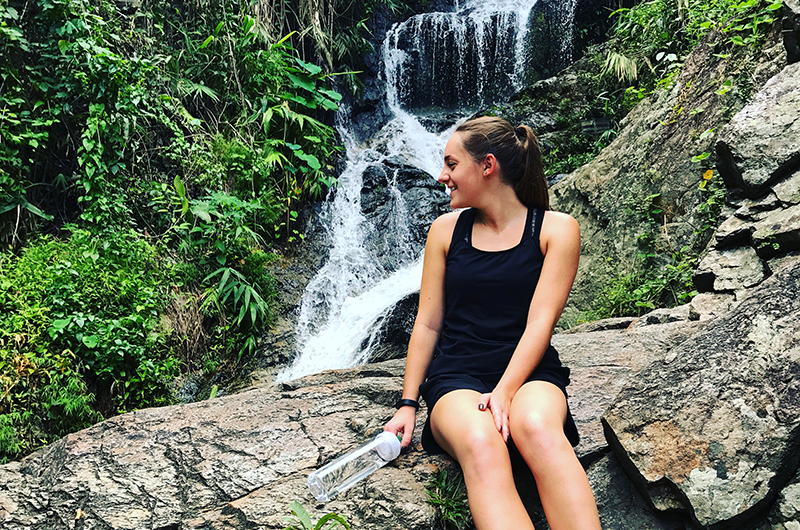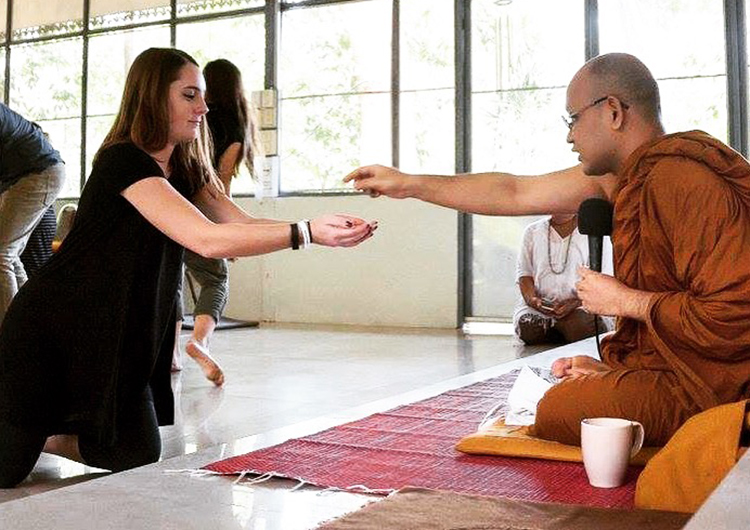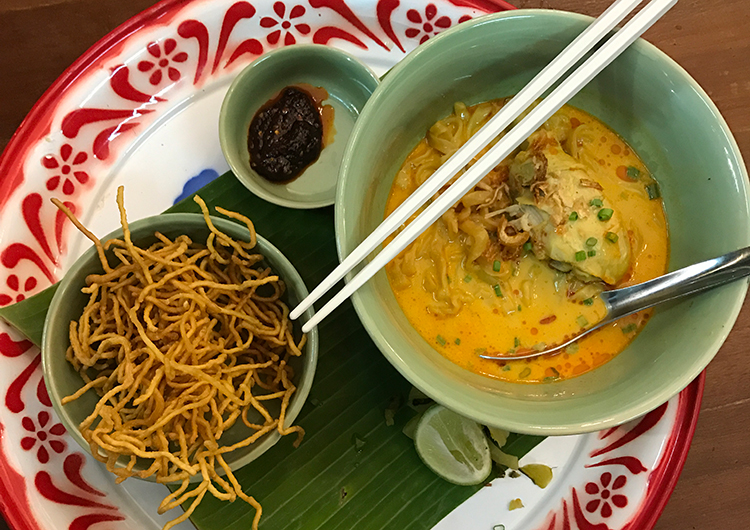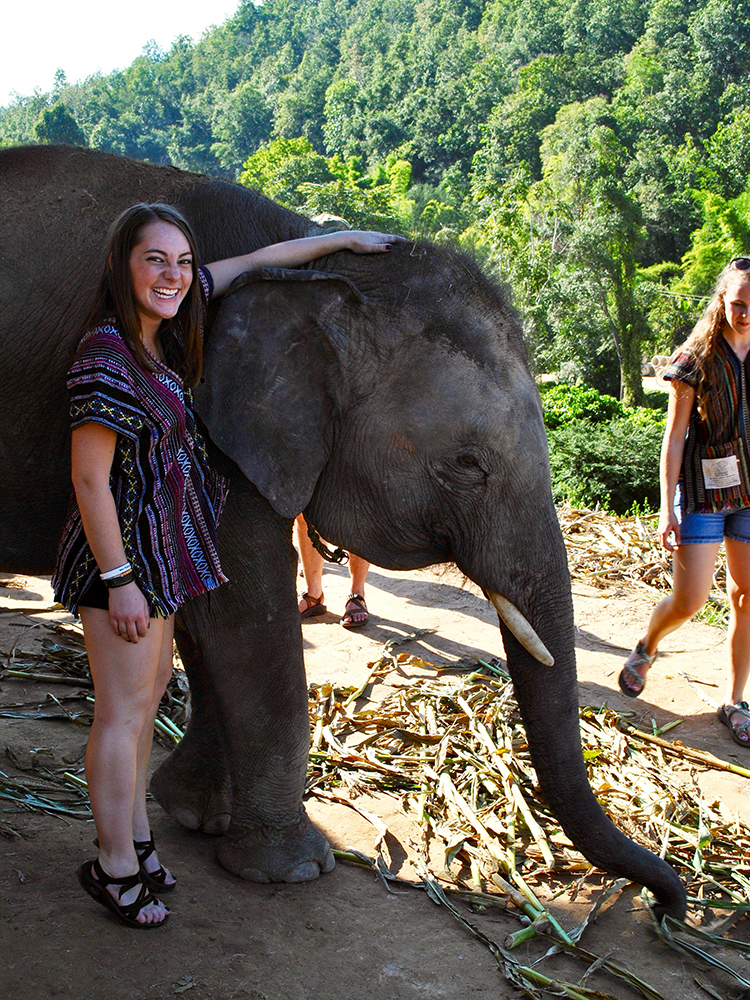Welcome to your own personal Thai language lesson with Teacher Rachel! What follows is a breakdown of five important phrases to know before embarking on your teach in Thailand adventure. It is my own personal belief that it is not only important, but also shows respect to learn these basic phrases in the native language wherever you plan to travel. To preface this post, I must warn you that expressions such as “hello” and “thank you” are not included.
1. Ka/krub (rhymes with ha/scrub) – This tiny little syllable is vital if you want to show respect and appreciation when you come to Thailand. If you’re a female, you say “ka” and if you’re a male, you say “krub”. It is basically the universal word for ‘please’ and ‘thank you’, and all politeness in general tied into one. It may sound a little like a hiccup, but please embrace it anyway. All you have to do is add it onto the end of any sentence or phrase here, and it’s like your own little formula to acceptance.
2. Gin kow reu yang? – In Thailand, it is not uncommon to be greeted by this phrase which means, “Have you eaten yet?” I actually just recently had firsthand experience with this during an exchange with a Thai teacher at my school. The moment I entered the teacher office at 7:30 am, the first thing my HOD (Head of Department) asked me was if I had eaten breakfast yet.
This may seem like an odd way to greet someone in your home country, but Thais take their cuisine very seriously, and rightfully so — they’re killing the culinary game! You simply respond with “chai” (yes) or “mai chai” (no — which may lead to an impromptu meal). Here, they equate food to happiness and health, so it makes sense that they want to ensure you have a full stomach when they see you.
3. Sanuk (sanook) – This word means “fun”, but it’s more so seen as a concept than simply a word. While Thais use this word literally to say the word “fun” in any given sentence, it also serves as an overarching idea. Don’t get bogged down by trivial nonsense that makes you unhappy. Get out there and enjoy yourself! And what better place to do so than in beautiful Thailand?
A lot of times the “Western way” of doing things disregards the notion of genuine happiness to make way for the concept of being successful and wealthy in a cutthroat world. In Thailand, it’s not like you’re discouraged from being successful, but Thai people also greatly value happiness and a good time. It’s so refreshing to be in a place that encourages smiles and laughter and good-old fun as a way of life.
4. Mai ped – This little phrase means “not spicy”. It’s especially important to know for those who do not handle spice well because often, even when you say ‘mai ped’, many foreigners would still consider the dish to be spicy.
Farangs, a harmless term used in Thailand to describe foreigners (this bullet point is a two-for-one), generally can’t handle Thai level spiciness very well. I can sympathize with Thais for not understanding the intricacies of foreigners’ threshold for spice. It’s like when my mom tells me something is spicy, and my taste buds are actually incapable of detecting one ounce of heat.
You can try to tell me you like spicy food and that you are ready to handle anything Thailand has to serve you, but just know that I warned you. I like spicy food just as much as the next person. But, let me tell you, you will understand the importance of this phrase once you have tasted a particularly hot tom yum (spicy soup) or an intensely spiced som tam (papaya salad).
5. Mai pen rai – I’ve noticed that most cultures tend to have their own little mantras that signify “relax” or “no worries”. In Spain it’s “no pasa nada”, in The Lion King it’s “hakuna matata”, and in Thailand it’s “mai pen rai”. It literally translates to “it doesn’t matter”, so it’s definitely handy to know this ~go with the flow~ phrase as you venture outside of your comfort zone in a completely new place.
I can assure you that after having just moved to my new placement, alone, in a town with minimal English, the culture shock is starting to set in. But not to fret, ‘mai pen rai’ is basically the antidote for culture shock.
I know that it may be a bit of a challenge for me right now adjusting to my new life, but I also know that it will get better. So, I repeat this ‘mai pen rai’ chant in my head in the midst of a difficult class or in a taxi ride during which the driver gets lost five times. And it serves as a reminder that being in Thailand and experiencing its beauty and culture makes all those trivial little bumps in the road during the journey simply “not matter”.
Squatty potty – So, technically, this phrase is not Thai, but it is an essential concept you must become familiar with if you plan on visiting, teaching, or living in Thailand. Toilets here are different — in many ways. You may be lucky enough to encounter a toilet you’re used to. But, you will also probably find that said toilet is not accompanied by toilet paper. Instead it comes with a “bum gun”, which is basically the same concept as a bidet. It looks like the spray nozzle next to your kitchen sink that you use to wash off stubborn food remnants.
However, what you will also run into if you are in Thailand for an extended period of time is a “toilet” that can be described as a glorified hole in the ground. As such, you must squat as low to the “toilet” as possible, and “flush” by scooping water out of the basin next to the ‘toilet’ with the provided pot. Next, you must pour said water into the ‘toilet’. Accept it and embrace it, but this time I will add the disclaimer that I’m crossing my fingers that you do not have severe knee problems or something like that.
There you have it — a handful of important phrases to keep in mind before beginning your adventure in Thailand.
Are you ready to embrace the unknown and enjoy the little discoveries you make as you navigate a new culture?
About the author:
Rachel is a native Chicagoan who recently graduated from Indiana University – Bloomington with a degree in Journalism and Spanish. After studying abroad in Seville, Spain and traveling throughout Europe during her time there, she was pleased to discover she had been bitten by the travel bug. She’s currently teaching English in Thailand to help sate her desire to discover new people, places, and cultures. You can follow her journey through her personal blog – Embellishing the Everyday.




[…] actually did write another blog post since you last heard from me, but for Greenheart Travel instead of for my own personal […]
[…] to teach in Thailand? Here are five phrases to know before you […]